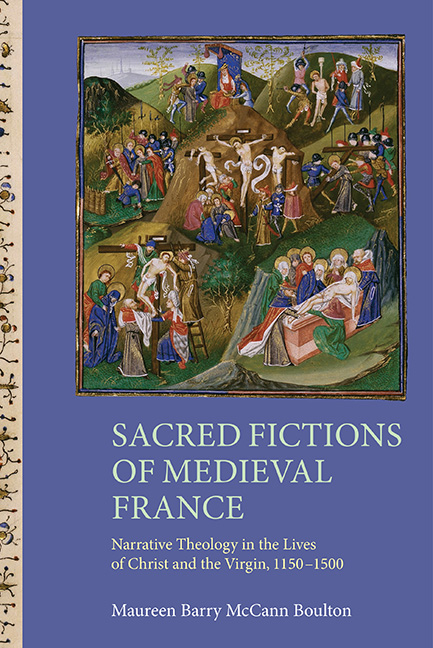 Sacred Fictions of Medieval France
Sacred Fictions of Medieval France Published online by Cambridge University Press: 11 June 2021
‘Or escoutés, seignour! Cancon dirai mont bele;
Ja m’orés voir parler de la bele puchele,
Et dirai vous del fruit que porta la vergele.’
(Paris, BnF, fr. 1444, fol. 24ra)[Now listen, lords, I will tell a most beautiful song; Now you will indeed hear about the beautiful maiden And I will tell you of the fruit that the Virgin bore.]
The chanson de geste, which typically recounts the wars of historical (and pseudo- historical) French heroes in the manner of an epic, has long been treated as the oldest genre of vernacular narrative in France. Nevertheless, for most of its recorded history it co-existed with the romance and was subject to many of the same influences. Thus, while the Old French epic probably originated in an oral tradition, the earliest surviving examples from the twelfth century (the Chanson de Roland, Gormont et Isembart, the Chanson de Guillaume), already reflect written, and often clerical traditions. The later chansons de geste were composed in the wake of these early examples, and compiled into the cycles of Charlemagne, the rebel barons, and William of Orange. As these cycles developed, some of the chansons de geste added to them were influenced by the conventions of the contemporary romance, but the epic genre retained its popularity through the fourteenth century, and in the fifteenth century many of the poems were reworked into prose.
In addition to its ‘historical’ content and its concern with high politics and warfare, the chanson de geste was distinguished by its meter and its form. In contrast to the octosyllabic couplet of romance, the epic poems were composed in longer, decasyllabic or alexandrine lines, grouped in stanzas (or laisses) of unequal length. Although the earliest examples were assonanced, the later poems were written in monorhymed laisses. Whether or not they were composed orally, the chansons de geste exhibit an inscribed oral quality, evident in the narrator’s appeals to the audience for silence or attention. Their formulaic language and themes are also those characteristic of epic poetry, and their motifs relate mainly to military activities – knights and their armour, descriptions of battles, and various types of individual combat.
To save this book to your Kindle, first ensure [email protected] is added to your Approved Personal Document E-mail List under your Personal Document Settings on the Manage Your Content and Devices page of your Amazon account. Then enter the ‘name’ part of your Kindle email address below. Find out more about saving to your Kindle.
Note you can select to save to either the @free.kindle.com or @kindle.com variations. ‘@free.kindle.com’ emails are free but can only be saved to your device when it is connected to wi-fi. ‘@kindle.com’ emails can be delivered even when you are not connected to wi-fi, but note that service fees apply.
Find out more about the Kindle Personal Document Service.
To save content items to your account, please confirm that you agree to abide by our usage policies. If this is the first time you use this feature, you will be asked to authorise Cambridge Core to connect with your account. Find out more about saving content to Dropbox.
To save content items to your account, please confirm that you agree to abide by our usage policies. If this is the first time you use this feature, you will be asked to authorise Cambridge Core to connect with your account. Find out more about saving content to Google Drive.